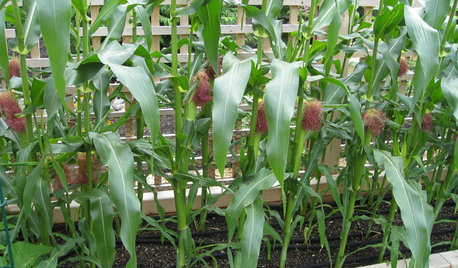How much oil in Corn Gluten Meal?
kuriooo
14 years ago
Related Stories

SUMMER FRUITS AND VEGETABLESHow to Grow Your Own Fresh, Sweet Corn
Here's how to plant and care for your own mini cornfield
Full Story
ORGANIZINGDo It for the Kids! A Few Routines Help a Home Run More Smoothly
Not a Naturally Organized person? These tips can help you tackle the onslaught of papers, meals, laundry — and even help you find your keys
Full Story

KITCHEN DESIGNKitchen Luxuries: The Wood-Fired Pizza Oven
If you love homemade pizza and are (ahem) rolling in dough, a wood-burning oven may be just the right kitchen investment
Full Story
LIFESimple Pleasures: A Real Sit-Down Breakfast
Give grab-and-go the heave-ho. To start the day right, treat yourself to a proper breakfast in a cheery spot
Full Story
PRODUCT PICKSGuest Picks: An Arsenal of Tools for Healthy Eating
Make cooking and juicing easier whether you follow a vegetarian, vegan, Paleo, primal or other diet
Full Story
HOLIDAYSHouzz Call: Share Your Personal Holiday Traditions
What winter rituals mean the most to you and yours? Post your stories and pictures
Full Story
KITCHEN DESIGNSweet Ideas and a Truffle Recipe from a Chocolatier's Test Kitchen
A $2,100 budget didn't mean a half-baked kitchen redo; this confectioner just rolled up her sleeves and rolled out the improvements
Full Story
KITCHEN DESIGNKitchen of the Week: Small, Creatively Used Kitchen
A food blogger whips up recipes out of a tiny Oklahoma kitchen — and sometimes spills over to the dining room table
Full Story
KITCHEN DESIGNHouzz Call: What’s Cooking in Your Kitchen?
Most of us turn to recipes, videos and culinary shows when we cook. Where do you set your cookbook, tablet or TV screen?
Full Story





bpgreen
bgtimber75
Related Professionals
Benbrook Landscape Architects & Landscape Designers · Port Royal Landscape Architects & Landscape Designers · Arden-Arcade Landscape Contractors · Garland Landscape Contractors · Hurricane Landscape Contractors · Lake Saint Louis Landscape Contractors · Marlborough Landscape Contractors · Medford Landscape Contractors · Soddy Daisy Landscape Contractors · Streamwood Landscape Contractors · Reston Driveway Installation & Maintenance · Forney Swimming Pool Builders · West Covina Swimming Pool Builders · Bellevue Fence Contractors · Oro Valley Fence ContractorsKimmsr
texasredhead
organictriplej_pa
texasredhead
bpgreen
kurioooOriginal Author
bpgreen
bgtimber75
Kimmsr
bpgreen
Kimmsr
bpgreen
Kimmsr
dchall_san_antonio
bpgreen